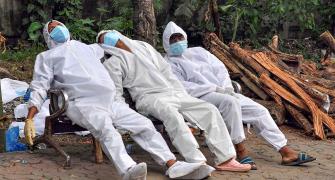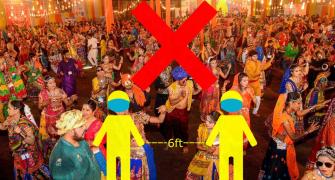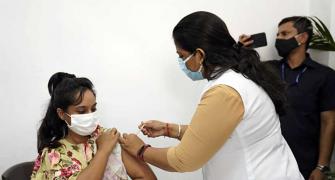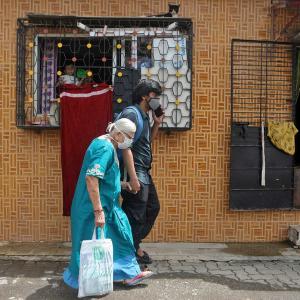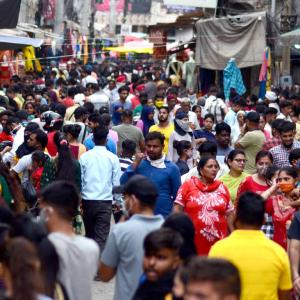'Wherever the Delta variant is spreading, and the population is not vaccinated, there is death and devastation.'
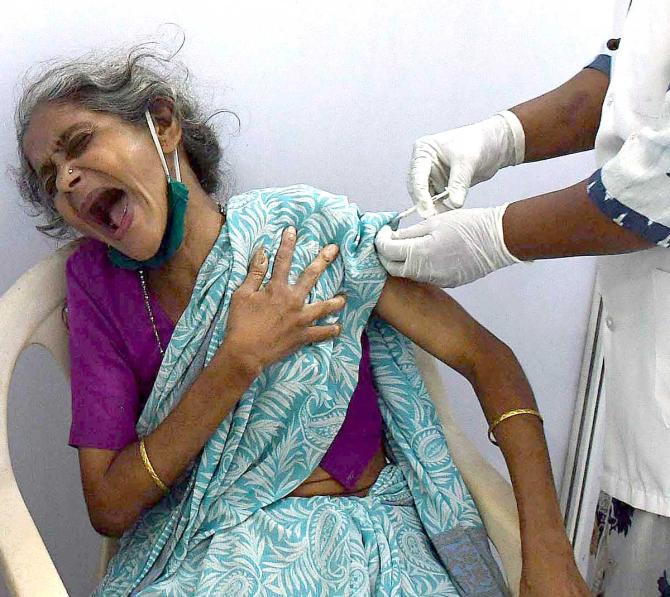
It's all immensely confusing. Enough to make your head spin.
Even more so now after the horrific second wave.
How do we process and sort these facts?
Like:
- News of the imminent arrival of the Lambda and Gamma variants of COVID-19 on our shores.
- The possibility that a mutant worse than the Delta variant could be showing up or lurking on our horizons.
- Reports that two shots of Covishield or Covaxin may not be enough for our protection and by the end of the year we may need boosters.
- And another wave is inevitable even if its contours and timelines are hazy.
Endocrinologist Dr Ambrish Mithal, attempts to clear the fog in the path in front of us and offer a clearer picture of what's ahead.
Awarded a Padma Bhushan and winner of the prestigious Dr B C Roy award, Dr Mithal, who is the chairman and head of endocrinology and diabetology at Max Healthcare hospitals, New Delhi, is one of the senior-most endocrinologists in the country. Over the past 16 months he has gained much experience in treating diabetics who have suffered COVID-19.
In a multi-part interview, Dr Mithal discusses with Rediff.com's Vaihayasi Pande Daniel the post-second wave situation, pandemic fatigue and new variants.
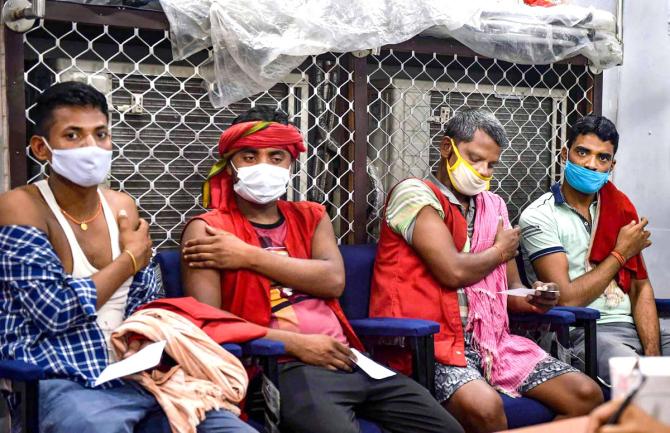
Broadly speaking, how does the COVID-19 situation in India look at the moment?
There are rises in cases in some places. In other areas, numbers seem to have plateaued.
I understand there will be differences in how the second wave abates in different parts of country and how the third wave might arrive, whenever it does.
Where do you feel we are poised?
Firstly, we can't judge India as a whole.
It's very difficult to make a statement about India as a whole, because India is like many countries rolled into one, in terms of the geography, in terms of the size of the population.
Definitely, there are some areas where the second wave has dramatically declined. It's unbelievable.
I live in New Delhi, and the way the case numbers have gone down, is quite dramatic. Regardless of whatever explanation we may try to find -- and we do have some explanations -- I don't think we have a really good explanation for the rapid decline of the wave in some parts, like in Delhi, Uttar Pradesh, Rajasthan, Madhya Pradesh. It's dramatically gone down. That kind of sharp decline, where the cases are now below 100, in Delhi, for the last 10 days or so, I think, is quite unusual.
It's not simply because of poor reporting (of case numbers) and/or under-testing. As a doctor, I haven't seen any COVID-19 case for the last three or four weeks. Before that, I was only seeing COVID-19.
In some areas COVID-19 cases have declined dramatically. In other areas it is kind of still lingering on or festering. And in some areas, there is a slight increase in positivity rates. It's mixed (a mixed picture).

What are the implications?
We are, still, as a country, seeing a large number of cases every day -- quite a large number.
Firstly, one of the things that we need to do is assess the pandemic primarily by hospitalisations and deaths, rather than number of cases. Because the number of cases is very variable and depends a lot on how well a state tests.
Kerala and Maharashtra perhaps test a little more. So, they always seem to be having larger number of cases.
To really assess the impact of the pandemic, we have to look at the hospitalisation rates and deaths. That should be a real index of how we're doing with regard to the pandemic.
Of course, case numbers are important, because it gives you an idea before this (deaths and hospitalisations) happens. But to really judge where we are, we have to look at the death rates. That will be the easiest, in the sense, that you can't really fudge too much - although there is some fudging in that also.
Quite clearly, in the areas where case numbers have gone down dramatically, they probably had a full burst of the Delta variant of the COVID-19 virus.
For example, in Delhi, I know for sure -- and this is aside from the data, of course -- everyone knew or had families that were affected, and all members of the family were affected.
During that period between the second week of April and the first week of May, there was devastation, and virtually everyone got affected.
Affected to the extent that people who had got it last year, some of them got it this year again. Or the fact that many of them had one shot of the vaccine, and they still got COVID-19. Some had a kind of partial protection, obviously (but in spite of it they got the illness).
Perhaps since the spread was so much that is the reason it has also declined as rapidly (the swathe of population affected was so high and so many people we affected that, perhaps, the virus quickly ran out of new horizons/people to spread to). It just came and went, leaving death in its wake.
In other areas, where it may either not have spread that fast, or maybe there are other variants, or maybe it's not the Delta variant, there it's probably still going on in a different way. And we don't know whether this will rise into a proper third wave. Or whether this will just fester at a lower level for some time. Really no one has a clear answer.

What should our approach be?
The issue, that I see, is basically about variants versus vaccine.
And what can we do to protect ourselves.
Obviously, I don't want to go over all the usual stuff again. We all know it -- masking, social distancing, this and that.
But we also know, that's difficult to implement worldwide, it's difficult to implement in India, and Indians aren't really following those kinds of (norms) at all.
More importantly, it's that we have to vaccinate as many people as we can.
Vaccination is happening. I wouldn't say it's terrible (situation) because I'm not a complete pessimist about that. But yes, there is a clear shortfall and it has to be made up.
We are vaccinating 35 lakh to 40 lakh people per day. But it has to be more. There are challenges there, which people are trying to overcome.
If we want to escape any future waves of the magnitude that we have seen, then we will need more and more vaccination.
We need to see how much is possible. Just by making a noise, we can't create vaccines. We really have to buy whatever's available and make it easy for the non-India-made vaccines to be available. Everyone has to pitch in. We can't say we are waiting (this or that) vaccine. That's all nonsense. We have to just do whatever we can.
The other part of what I mean when I say vaccine versus variants is: The curve of the pandemic will be determined by how fast you can vaccinate. But if this virus mutates to something more deadly, then then it's a real problem, especially if that strain is a little resistant to the immunity we develop from a prior infection or with a vaccine.
We know that vaccines work against the Delta variant, but they work a little less. Similarly, if the virus keeps mutating and there is some degree of vaccine escape, then we are in big trouble.
Then I see a big third wave.
If that doesn't happen and if there is no significant mutation, or change in behaviour of the virus, then if we are able to vaccinate people fast, and observe some degree of sanity (ie COVID-19-appropriate behaviour) -- instead of going completely insane, as we are right now -- then, I suppose, we will see some increase, of course, but not a blast. Not what we saw in April, which was like a nightmare.
Variants are confusing business. The London variant didn't hit us bad, nor the South Africa and Brazil variants like the Delta variant did.
Are the Lambda and Gamma variants worrying?
Can the Delta variant mutate into either something worse or hopefully something less terrifying?
Could it be that we may very well sidestep both Lambda and Gamma?
Yes, of course.

But you do say the Delta variant can mutate?
Not the Delta variant per se, but the virus itself. The virus can keep mutating. It won't be called a mutation of the Delta variant -- it is an additional mutation of the virus itself. It can have a little different form. The Delta variant is one from. Then there is this so-called Delta Plus variant, which they are talking about in India.
All those things will go on happening. Viruses will mutate. That's not a problem.
The problem is if the mutant virus that is formed, as a result of the mutation, is more virulent, or more transmissible. Most mutations are not like that.
One important point I should put out there is that much more extensive genomic testing is required. We need to pick this up (the arrival of a new mutant/variant of concern) very fast and not wait for disaster to hit us again.
If we act on these three things -- (vaccination, swifter genomic testing, analysis of hospitalisation and death rates) -- (we should be okay).
People don't like it when I say it -- they get almost aggravated -- they say, what is science then?!
But the truth is, we really don't know that how the virus is going to mutate and behave. Some people will say we should know everything (about why these events have happened the way they did) and we should have predicted everything.
Everyone said we're going to have a second wave. But I don't think anyone or any expert, at least in the Indian context, was prepared for the magnitude of the wave that came.
It's always easy to blame others, but the fact is: Were we really anticipating some such wave?
Look what's happening in Indonesia right now.
People don't like to talk about these things. But it's just two lines: Wherever the Delta variant is spreading, and the population is not vaccinated, there is death and devastation.
Wherever the Delta variant is spreading, and there is good vaccination, like the UK and the US, where there is an increase in number of cases, it doesn't translate into too much increase in deaths.
Despite the lower protection offered by the vaccine, against this Delta variant, if the population is vaccinated, the infections will still happen, but people won't die.
The same Delta variant is circulating in UK and US and now in five or six countries of Asia. But it's wreaking death and devastation in Indonesia. I believe there are no spaces for graves in Indonesia.
Similarly in Latin America now, Peru has the highest death rates in the world.

Populations are divided into people who are much more cautious and people who are less cautious. For people who are slightly more cautious, the kind of uncertainty that this present lull has brought on, where cases have dropped in a lot of areas and the second wave is ebbing, is confusing.
Do we dare un-pause our life? Our life has been on pause for so long. Or is it just better to hang on to the pause button.
As a physician/doctor, you must also be feeling this lull and what do you make of it.
I think, we cannot let our guard down
We may un-pause, but we have to move very slowly and very cautiously.
Life cannot be at a standstill also. Essential activities related to work and business should resume, with full precautions.
But leisure activities, and activities of lower priority -- which are non-essential activities -- should still be on hold. This will also be determined by the area where you're in, and how that area is doing in terms of positivity rates and all, that will determine the extent of opening up of activities.
Number one, there has to be opening up. We cannot continue like this.
Number two, opening up has to be graded.
Number three as an individual, we have to make sure we are not indulging -- sorry to say, but I would say socialising is not a necessary activity right now.
 IMAGE: Dr Ambrish Mithal. Photograph: Kind courtesy Dr Ambrish Mithal
IMAGE: Dr Ambrish Mithal. Photograph: Kind courtesy Dr Ambrish MithalEven among the vaccinated?
If everyone is double vaccinated, then it's okay. That's two to three weeks after the second vaccine.
The other thing people don't realise is that socialising in indoor environments, meetings in indoor environments, offices, even hospitals, those are the biggest sources of breakouts.
Socialising in open environments, going for a walk in the garden together or meeting friends in an open-air cafe, where you have to take off your mask is much, much less likely to create a problem.
We sometimes think that we are indoors and we're calling our friends and they're all vaccinated and then we don't know that one of them was not vaccinated and that can create havoc, when we could meet same people outside.
It's two things (when meeting others), A. We should not take off our mask as far as possible, except for eating. And if you do take off our mask, it should be in an outdoor environment.
Feature Presentation: Ashish Narsale/Rediff.com

